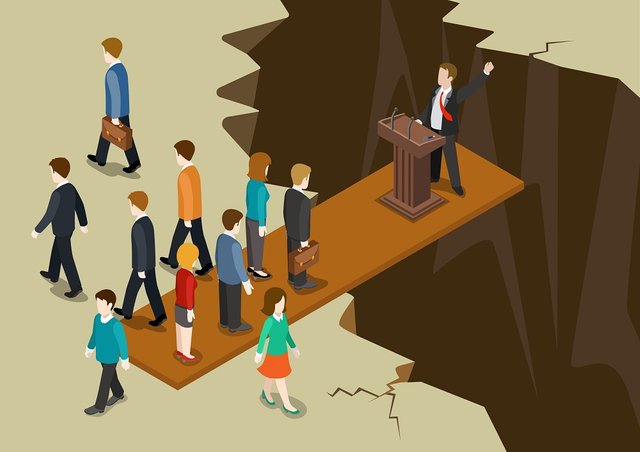This weekend was a big one in the Crypto Currency with massive drops in all the currencies. I have some investments across various crypto's and all went down. This is however part and parcel of the industry we play in. But what goes up must come down. But also what goes down will probably go up again :)
Today's article is again for the non-technical people in explaining why the blockchain technology is such a wonderful tool to enable trustless consensus. There is a lot of complexity which in my mind is not really essential to understand. I will try and highlight the essential concepts in this article.
Let's start by quoting Satoshi Nakamato who is the founder of this new technology:
A purely peer-to-peer version of electronic cash would allow online payments to be sent directly from one party to another without going through a financial institution.
There are a lot of key aspects things in the above statement, but for me the most important point in the statement is without going through a financial institution
Why do we have banks?
I believe that the only reason for having banks today is due to the fact that we evolved to this point where we still believe that it is important. The human race in general became used to it through the many years during the evolution to the point where we are today. To be honest, up to now, we did not really have any choice. When you start a new job, one of the first things the Human Resources department will ask you to complete is your banking details, as this is the de facto way of paying individuals. This is also the de facto standard which the world use to pay for anything. A bank card.
Why is this the de facto standard, well, everybody trusts banks and the whole financial system. This is the way we are all used to operating and spending cash.
Blockchain and crypto currency is changing this ... One step at a time.
There is no way to change the human behaviour in banking with a financial institution without finding a different way of creating a environment where people trust the new system, or way of using and spending money. So the main thing that Satoshi got around the problem of trust, is to create a system, where nobody needs to trust anybody in the system as the system creates the trust by default. He did this, by using what is called Proof of Work (POW), to create a network of distributed users which through the environment he created generate a trustless consensus Proof of work wasn't a new concept, but he combined it with other existing concepts, like Peer-to-peer networking and clever cryptographic signatures,,
Crypto Currency was the first basic application on the above mentioned technology set, which made it quite ingenious.
So why is it trustless?
Let's go back to the financial institution. Why do we trust banks and the current financial system? Well, they have been around for so many years that they are just trusted.
We know that they systems and controls in the bank can be trusted for a few reasons:
- We trust that they won't randomly take some of your money
- We trust that they won’t make it worth less as they are part of a bigger framework, where the money is issued by governments.
- We trust that the information provided by them are actually correct. This is because they are part of financial bodies that actually have standards that they must adhere to.
But what if we are able to create this trust with technology. Something that cannot be wrong, something where the same money can never belong to the same person at the same time. Something that we do not even have to think that it cannot be trusted as a result of how the technology works. This is exactly what Bitcoin and Blokchain gave us.
The way that the algorithms and the miners on the blockchain work together, makes it impossible to "bullshit" the system.
Consensus
The premise of any blockchain is that everybody in the network must agree to something which is called consensus is reached. This is not very different than today's fiat money. We all reached consensus that our currency is valuable as surely you trust the money you receive and use to pay for goods and we believe that everybody else have the same opinion. We do not have to worry that it will not be trusted as it is trusted by default.
So how is this done in Bitcoin?
It is important to understand and trust a few things:
- We should be able to trust that the originator of a Bitcoin transaction is in possession of the funds being transferred.
- We need to trust the originator of the transaction received the funds in some or other way.
- We need to trust that the transaction is trusted by everyone in the network.
- After the transaction is done, we need to trust that the originator of the transaction is not in possession of the funds anymore.
In order to obtain the above Bitcoin Miners do the following:
Each of the Bitcoin Miners has software running. They work from the premise that nobody's information can be trusted until somebody finds the answer to find a specific encrypted number which has been hashed.. The number is becoming more and more difficult as the network and the money supply is growing. The moment that the hashed number is found, the software changes in a way where everybody needs to confirm that the number is correct. This way we have a seamless battle of each person in the network checking each others work but confirming that there is only one correct answer.
This process goes on and on taking all of the points above into account. With other words we do not need to trust any specific individual in the network as everybody in the network works toward the same goal of validating everybody else's work in the network, which generates a trustless network.
Happy Steeming!




Loved your article, I am waiting for a day when someone joins a new job and HR asks for the wallet address instead of bank details. The day we are able to trust so much on technology will be the day when there will be a financial revolution in history.
Downvoting a post can decrease pending rewards and make it less visible. Common reasons:
Submit
Thank you for your great comment @looftee :) and I believe that the financial revolution will be the cause for HR to request your wallet address instead of bank details. I think it is going to happen sooner that we all think... or let's rather say I hope.
Downvoting a post can decrease pending rewards and make it less visible. Common reasons:
Submit
I am a non techie, so I learned a thing or two from your post. So I am following you now, keep posting stuff like this.
Downvoting a post can decrease pending rewards and make it less visible. Common reasons:
Submit
Thanks @looftee :) Have a look at my previous posts. I post "in laymens terms"on things like this quite often.
Downvoting a post can decrease pending rewards and make it less visible. Common reasons:
Submit
And also followed you :)
Downvoting a post can decrease pending rewards and make it less visible. Common reasons:
Submit
I surely will, and Upvote them all, though my upvote don't give much but it is whatever I can Give in return for you spreading knowledge.
Downvoting a post can decrease pending rewards and make it less visible. Common reasons:
Submit
Congratulations @jacor! You have completed some achievement on Steemit and have been rewarded with new badge(s) :
Click on any badge to view your own Board of Honnor on SteemitBoard.
For more information about SteemitBoard, click here
If you no longer want to receive notifications, reply to this comment with the word
STOPIf you want to support the SteemitBoard project, your upvote for this notification is welcome!
Downvoting a post can decrease pending rewards and make it less visible. Common reasons:
Submit
Crypto money is like a bouncy ball....up and down and up and down....

Downvoting a post can decrease pending rewards and make it less visible. Common reasons:
Submit
Indeed :)
Downvoting a post can decrease pending rewards and make it less visible. Common reasons:
Submit
awesome writing. upped ^^
Downvoting a post can decrease pending rewards and make it less visible. Common reasons:
Submit
Thanks @royalmacro .. Followed you by the way. I see you are a freelance programmer ... Which languages and what are you doing now?
Downvoting a post can decrease pending rewards and make it less visible. Common reasons:
Submit
C, C++, Visual Basic, PHP, HTML & Java. I'm now developing web & software, blogging & investing in cryptocurrencies. Also, I'm a full time FOREX & crypto trader.
Downvoting a post can decrease pending rewards and make it less visible. Common reasons:
Submit
Great to know @royalmacro . I have a company doing many things in the Blokchain / Crypto space. Do you still dev or only trade :)
Ps: How was this weekend for you?
Downvoting a post can decrease pending rewards and make it less visible. Common reasons:
Submit
Actually I studied in Computer Science & Engineering (CSE). So basically I learnt all the above languages. But, I'm not very familiar to blockchain technology & its development, I'm planning to learn very shortly. Now, I've massively invested in BTC, LTC, DOGE, ETH & XRP. Yet not invested in XMR & DASH. I regularly trade on Poloniex, Bittrex, Bitstamp, Cubits, Coinsecure, Zebpay & Unocoin. And for FOREX trading I only choose Roboforex.
This weekend was horrible for huge volatile tendency of crypto markets. I'm in loss now, hope price will go rise again :)
Downvoting a post can decrease pending rewards and make it less visible. Common reasons:
Submit
Good to know... Not too worry, like Guiness say: All comes to those who wait:) The crypto market will return to its desired state :)
Downvoting a post can decrease pending rewards and make it less visible. Common reasons:
Submit
Thank you :)
Downvoting a post can decrease pending rewards and make it less visible. Common reasons:
Submit
much appreciated , will look at your other posts as well.
Downvoting a post can decrease pending rewards and make it less visible. Common reasons:
Submit
Thanks for the comment @pamfrench :)
Downvoting a post can decrease pending rewards and make it less visible. Common reasons:
Submit
Everyone thinks the fundamentals of banking is ultra complicated, that no technology can simplify it. This thought is what makes it a normal person to think of Bitcoin as a sham.
I liked the simple way in which you explained this. Upped!
Downvoting a post can decrease pending rewards and make it less visible. Common reasons:
Submit
Thanks for the great comment @nrasejh
Downvoting a post can decrease pending rewards and make it less visible. Common reasons:
Submit
Well it certainly can't be denied that bitcoin prices are being manipulated on an hourly basis. That's the ONE advantage a bank account has over a paper wallet. :-) I doubt we will ever find out if the U.S. govmint backed insurance policy on all bank accounts of $250K or less was a sham. The almighty dollar will certainly be the very last "fiat" currency standing. So for those who "prefer" not being taken advantage of by the sharks on Wall St, the U.S. dollar currently offers MUCH more stability than Bitcoin. Tis an "undeniable" fact at this point...no?
Downvoting a post can decrease pending rewards and make it less visible. Common reasons:
Submit
Thanks for your easily understood article, clarified alot of issues for me.
Downvoting a post can decrease pending rewards and make it less visible. Common reasons:
Submit
Great to know @marcell1965. Glad I can help.
Downvoting a post can decrease pending rewards and make it less visible. Common reasons:
Submit
Thanks. Nice explanation. Might use it to inform the unconverted.
Downvoting a post can decrease pending rewards and make it less visible. Common reasons:
Submit
Thank you very much for the comment @krabgat
Downvoting a post can decrease pending rewards and make it less visible. Common reasons:
Submit
Good article.
But, do end users (not software developers) of the system need to actually trust the software code release that makes trustless consensus operate?
The system in operation (software, network of nodes, etc.) does indeed create a "trustless" environment between parties, assuming enough parties continue to participate to keep it sufficiently decentralized. But as an end user (assuming no inspection of software code is realistic), I feel I do need to trust the open source software that runs the system.
Downvoting a post can decrease pending rewards and make it less visible. Common reasons:
Submit